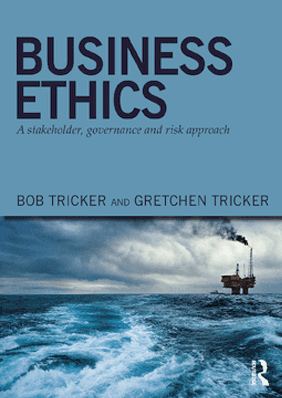Business Ethics
A stakeholder, risk, and governance approach
Bob Tricker and Gretchen Tricker (Routledge, 2014)
This book not only considers what business ethics are, and why they are important, but offers practical approaches on how to develop a successful corporate ethics culture.
Why study business ethics?
The past decade has seen a spate of corporate crises around the world. Enron, one of America’s largest companies, failed dramatically with some of its directors going to jail, whilst apparently fulfilling the tenets of sound corporate governance. Despite policies on corporate social responsibility and sustainability, oil company BP lost over half its share value following the Deepwater Horizon oil-rig debacle in the Gulf of Mexico. Many multi-national companies manoeuvre funds through tax havens to avoid taxation, yet claim to be good corporate citizens. Concerns about business ethics are widespread and serious. Questions are raised about companies’ actions despite their apparent commitment to CSR, ethics codes, and compliance reports.
Around the world, the behaviour of companies, the attitudes of their directors, and the actions of key executives have all come under the public spotlight: the world-wide collapse of auditors Arthur Andersen, fraudulent management in Australia's HIH Insurance, corruption in Italy's Parmalat, allegations of bribery against BAE Systems in Europe, the rigging of interest rates by British banks and, of course, excessive risk taking by financial institutions around the world that sparked a global economic crisis.
Such cases raise issues of business ethics. They also involve the way companies are governed, how power is exercised over them, and the way business risks are taken.
What the book is about
Many books and courses on business ethics focus on companies’ social responsibilities, their relations with their stakeholders, and corporate citizenship. More recently, green credentials and sustainability have been added to that agenda.
This book argues that business ethics are basic to running business not a separate subject. They are inherent to the governance and management of every organization not an optional exercise in corporate citizenship. Ethics are about behaviour. Business ethics concern behaviour in business and the behaviour of business. Decisions at every level in a company have ethical implications – strategically in the board room, managerially throughout the organization, and operationally in each of its activities.
Corporate governance is concerned with the way companies use their power and the way power is exercised over companies. The use, and sometimes the abuse, of that power raise ethical issues. Inevitably, business involves risk. Whether decisions are at the strategic, managerial, or operational level, ethical risks abound. The board of directors and top management are responsible for establishing their company’s risk profile, determining the acceptable level of risk. Some companies accept higher levels of risk than others. Exposure to ethical risk needs to be part of every organization’s strategy formulation, policy making, and enterprise risk management. With moral dilemmas in business it is often not a matter of right or wrong, but what’s best for all concerned, both in the company and among all those affected by its actions.
Ultimately, the board of directors and top management are responsible for the ethical behaviour of their enterprise. Directors set the standards for their organization, provide the corporate conscience, and fashion its culture. They generate the value system for the organization.
Critics of business behaviour point to fraud, bribery and corruption. They allege price-rigging, pollution, and counterfeiting. They see arrogance, greed, and abuse of power by those at the top of companies. Some are cynical about business behaviour. How can you trust these people, they ask? Protestors challenge the basis of capitalism. For them, business ethics has become an oxymoron, citing corporate avarice, disparity of wealth, and massive director remuneration that is not reflected in corporate performance.
Yet business exists by satisfying customers, creating employment, and generating wealth. Business provides the taxes that society needs to function. Many companies accept a social responsibility to be sound corporate citizens. They recognize that they have a duty to respect the interest of all the stakeholders who might be affected by their actions. Many also seek a sustainable, environmentally friendly approach to their operations. To those who doubt whether modern business can be trusted, they point out that business dealings and the very concept of the limited-liability company are based on trust. Not everyone is convinced.
The book is a primer on ethics in business. It is not about moral philosophy or psychology. Nor does it prescribe appropriate standards of behaviour or recommend economic, legal or political solutions. Rather it enables readers to recognize ethical issues when they arise in business, to respond appropriately, and to embed ethics in business processes. The book not only considers what business ethics are, and why they are important, but offers practical approaches on how to develop a successful corporate ethics culture.
Who the book is for
Primarily, the book is for students on specialist masters’ level courses in business ethics, corporate governance, and risk management. Additionally, it can complement law, accountancy, and business studies courses, and MBA programmes. The book may be used as the textbook for the qualifying examinations of professional bodies in accountancy, company direction, corporate secretarial, and law. It will also be useful for the education, training, and continuing professional development of:
• chairmen, directors and senior managers of companies
• chairmen, board members, and trustees of not-for-profit organizations, including state enterprises, non-government organizations, and charities
• auditors, company secretaries, company lawyers, and corporate advisers
Given the growing interest in business and ethics, the book may also appeal to those interested in the place of companies in society.











